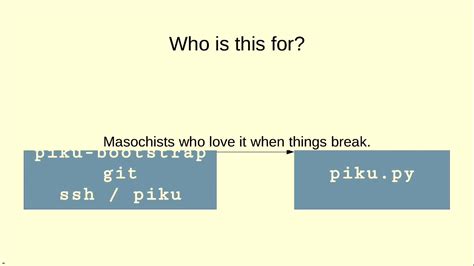In the crowded world of development toolkits and deployment strategies, finding the right balance between simplicity and functionality can be a daunting task. That’s where Piku comes significantly into play. Unlike other self-hosted PaaS (Platform as a Service) solutions such as Dokku, Piku allows developers to deploy their applications to their servers via a simple ‘git push’ command. What makes Piku truly stand out is its departure from Docker dependencies, thereby addressing the needs of lightweight, minimalistic setups while retaining robust deployment capabilities.
One of the fascinating aspects of Piku is its ability to operate without the heavy overhead of Docker. This is not to dismiss Docker’s merits, as many argue for its benefits in terms of isolation and environment consistency. However, as shared by one of the key contributors, the inability to run Docker on certain targets necessitated the creation of something more versatile. Piku’s methodology of leveraging standard git operations and traditional process management tools like uWSGI or supervisor makes it flexible for use on a wider range of platforms, including older or less resource-rich environments.
While Docker’s potent isolation features often streamline deployment, the lack of dependency on Docker in Piku eliminates a common bottleneck: OS version dependencies. Removing Docker from the equation allows applications to be directly dependent on the underlying operating system, which can lead to more lightweight deployments. Developers who maintain applications that need to run seamlessly for years without frequent updates can breathe a sigh of relief knowing that Piku opts for stability over the latest containerization technology.
However, some concerns were raised in the comments about maintaining long-running applications and the potential impact of OS updates. For instance, upgrading the operating system without breaking existing applications was a critical point brought up by users. One solution suggested was the use of long-term support (LTS) distributions, which can offer the necessary stability and longevity for most projects. Additionally, tools like pyenv or virtualenv can help manage dependencies effectively, ensuring that applications remain stable and functional over time.
Security remains an inevitable aspect of deployment, and running applications on outdated systems can pose significant risks. As echoed in the discussions, a balance must be struck where updating becomes a necessity rather than an option. Users highlighted various solutions, ranging from using secure and stable OS releases to leveraging modern tools like Nix and systemd that enhance isolation and security while maintaining compatibility. For instance, leveraging cloud-native buildpacks can significantly simplify the build and deployment process by automatically handling dependencies and runtime environments.
For those interested in diving into Piku, the project’s freshly updated documentation provides a clear overview and step-by-step guidance. From setting up a remote repository to handling environment variables and integrated processes, the documentation aims to bridge the gap for new users. Enhancing the appeal of Piku further, developers have shared tutorial repositories and links demonstrating how to get started quickly with a web application, ensuring that the initial learning curve is as gentle as possible.
Interestingly, beyond the technical capabilities, the community has shown an eagerness to contribute and adapt Piku to new scenarios. Whether it’s using Piku for static websites, integrating with existing CI/CD pipelines, or managing complex deployment workflows, contributors are continually expanding its horizons. The simplicity of ‘git push’ deployments combined with the flexibility of handling multiple runtimes makes Piku an enticing choice for developers seeking a minimalist yet powerful deployment tool.


Leave a Reply